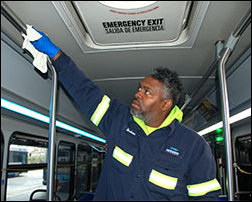by James A. Bacon
Another data point in the ongoing debate over cars versus mass transit…
The Washington Metropolitan Area Transit Authority has asked riders to stay home and not to travel, as the agency prepared to cut service Wednesday, reports the Washington Times. Ridership has already fallen 70%.
Metro, which operates buses and commuter rail in the Washington area, will continue to provide service for essential trips. In the past trains normally ran every four minutes during rush hour and no less frequently than every 12 minutes during the day. now they will run every 15 minutes on each line from 5 a.m. to 11 p.m. weekdays.
The loss of revenue will have a significant impact on Metro finances. Farebox recovery accounts to 57.5% for Metrorail and 24.3% for Metrobus. I guess it won’t be long before Metro asks for another bailout. Update: Question answered in one day. According to the Washington Post, the transit agency is asking for $50 million a month in emergency federal aid. Update: Meanwhile, according to Virginia Business, the Commonwealth Transportation Board has allocated $11 million to help struggling transit systems recover from ridership losses.
Meanwhile, in the Richmond area the GRTC says it is operating service normally, except for the Kings Dominion Express, which it has discontinued until April. The transit service has closed its administrative offices.
In a statement today, the system described procedures it has instituted to prevent the spread of diseases on its buses by frequent cleaning.
- A quarter of our buses (about 35 buses a day) are rotated every weekday morning before the start of the service day for cleaning, where all publicly used surfaces and high-touch areas (fareboxes, seat handles, seats, door handles, etc.) are wiped down with disinfectant cleaners, the floors are mopped with disinfectant, and windows are cleaned with disinfectant. This means the entire fleet is disinfected every four days.
- GRTC increased the frequency of fleet cleaning, prioritizing CARE vehicles and Pulse buses. CARE vehicles are used by many at-risk passengers and Pulse buses carry more passengers than any other vehicle consistently.
- Pulse stations are already cleaned at least once a day using disinfectants. GRTC also cleans the Ticket Vending Machines daily.
No word on ridership and revenue loss.
Hampton Roads Transit, which operates buses and the Pulse light rail line, has posted no coronavirus-related news on its website. But on a “Facts about the Coronavirus” page, it shows a photo (reproduced above) of an employees wiping clean a metal handrail in a bus.
Arlington Transit (ART) took a proactive stance early. A March 6 press release noted that the bus system was educating bus drivers about the virus, distributing hand sanitizers to employees, installing hand sanitizer dispensers at facility entrances, and deep cleaning buses each night. On March 14, ART announced that it was cutting back bus service “to help slow the spread of the virus.”
The Charlottesville Area Transit (CAT) website notes that the downtown transit station has reduced operating hours from 8 a.m. to 5 p.m. weekdays, due to coronavirus-related concerns, but buses are operating on a normal schedule. CAT has taken “additional measures to enhance cleaning capacity and scheduled cleaning services” for all transit and school buses.
No coronavirus news updates posted by the Valley Metro in Roanoke.



